Critical Thinking Skills: Evaluating Case Studies Report
VerifiedAdded on 2021/02/21
|14
|4807
|98
Report
AI Summary
This report delves into critical thinking skills by analyzing two case studies. The first case study evaluates the purpose of critical thinking, claims related to democracy and totalitarianism, and the development of valid arguments. It critiques the viewpoints presented, identifying positive and negative aspects, with a focus on democracy's advantages and the flaws of totalitarian regimes. The second case study examines logical reasoning in the context of lifestyle choices influencing clinical decisions. The analysis explores the use of critical evaluation skills to validate points, offering insights into how lifestyle choices should or should not influence clinical decisions. The report emphasizes the importance of critical thinking for effective analysis, decision-making, and understanding complex viewpoints within political and societal contexts.
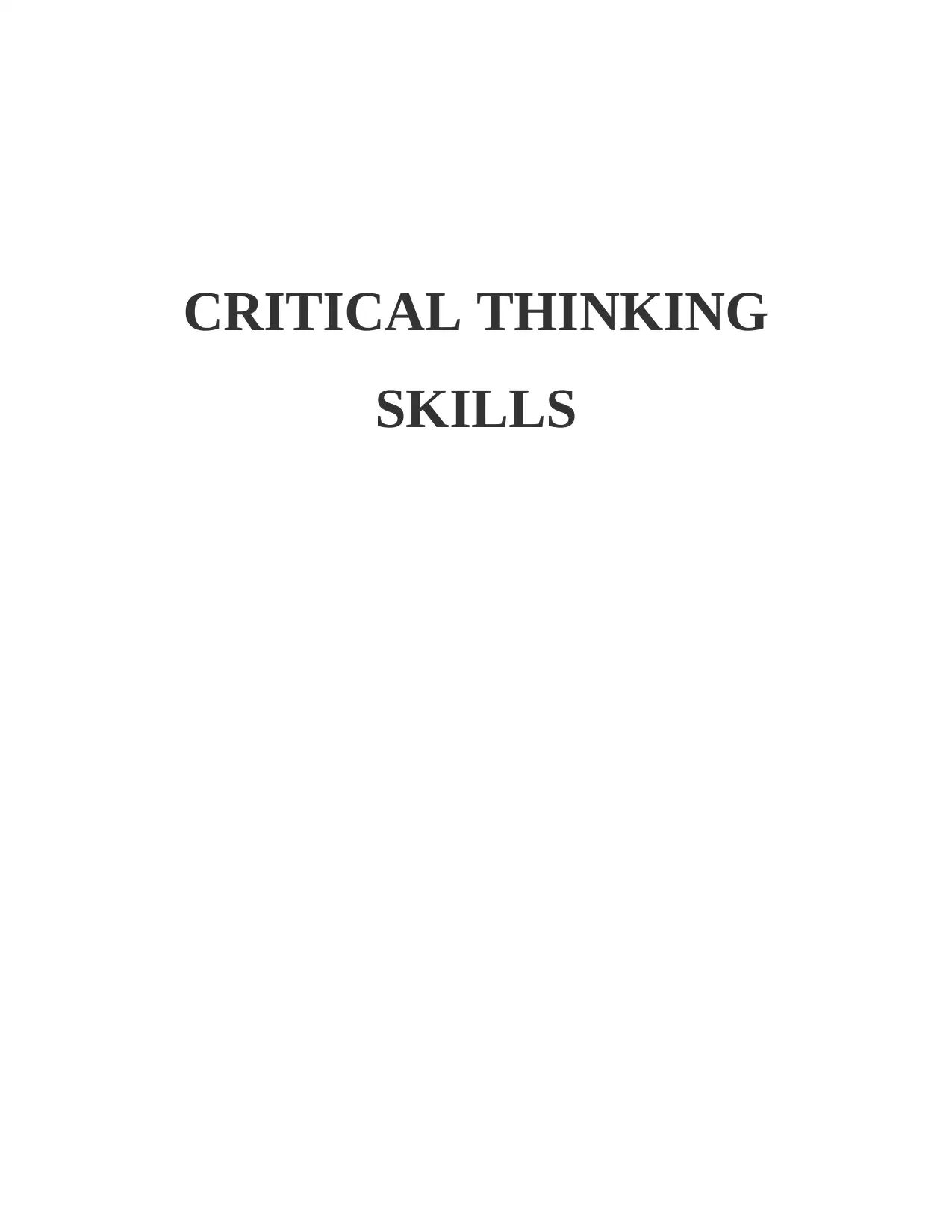
CRITICAL THINKING
SKILLS
SKILLS
Paraphrase This Document
Need a fresh take? Get an instant paraphrase of this document with our AI Paraphraser
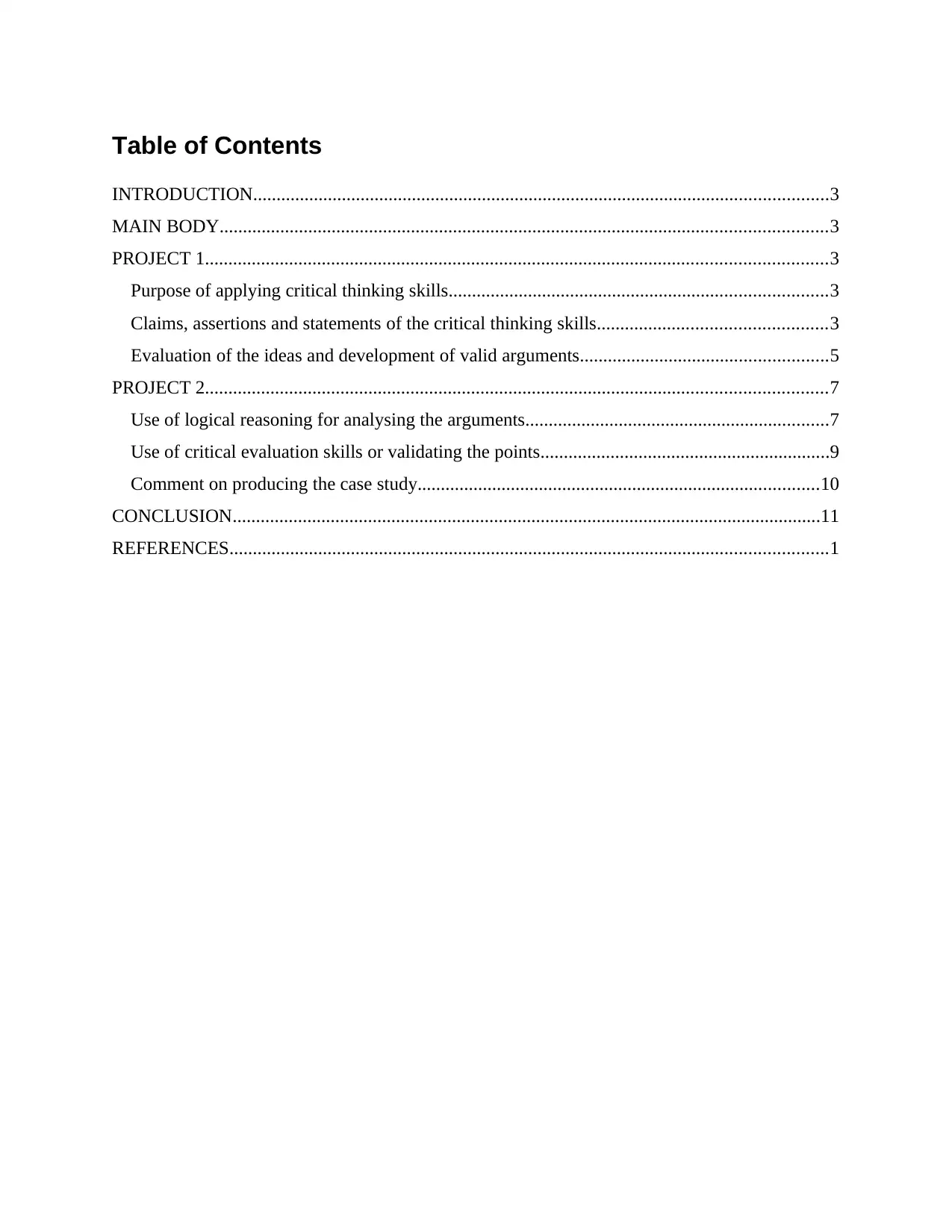
Table of Contents
INTRODUCTION...........................................................................................................................3
MAIN BODY..................................................................................................................................3
PROJECT 1.....................................................................................................................................3
Purpose of applying critical thinking skills.................................................................................3
Claims, assertions and statements of the critical thinking skills.................................................3
Evaluation of the ideas and development of valid arguments.....................................................5
PROJECT 2.....................................................................................................................................7
Use of logical reasoning for analysing the arguments.................................................................7
Use of critical evaluation skills or validating the points..............................................................9
Comment on producing the case study......................................................................................10
CONCLUSION..............................................................................................................................11
REFERENCES................................................................................................................................1
INTRODUCTION...........................................................................................................................3
MAIN BODY..................................................................................................................................3
PROJECT 1.....................................................................................................................................3
Purpose of applying critical thinking skills.................................................................................3
Claims, assertions and statements of the critical thinking skills.................................................3
Evaluation of the ideas and development of valid arguments.....................................................5
PROJECT 2.....................................................................................................................................7
Use of logical reasoning for analysing the arguments.................................................................7
Use of critical evaluation skills or validating the points..............................................................9
Comment on producing the case study......................................................................................10
CONCLUSION..............................................................................................................................11
REFERENCES................................................................................................................................1
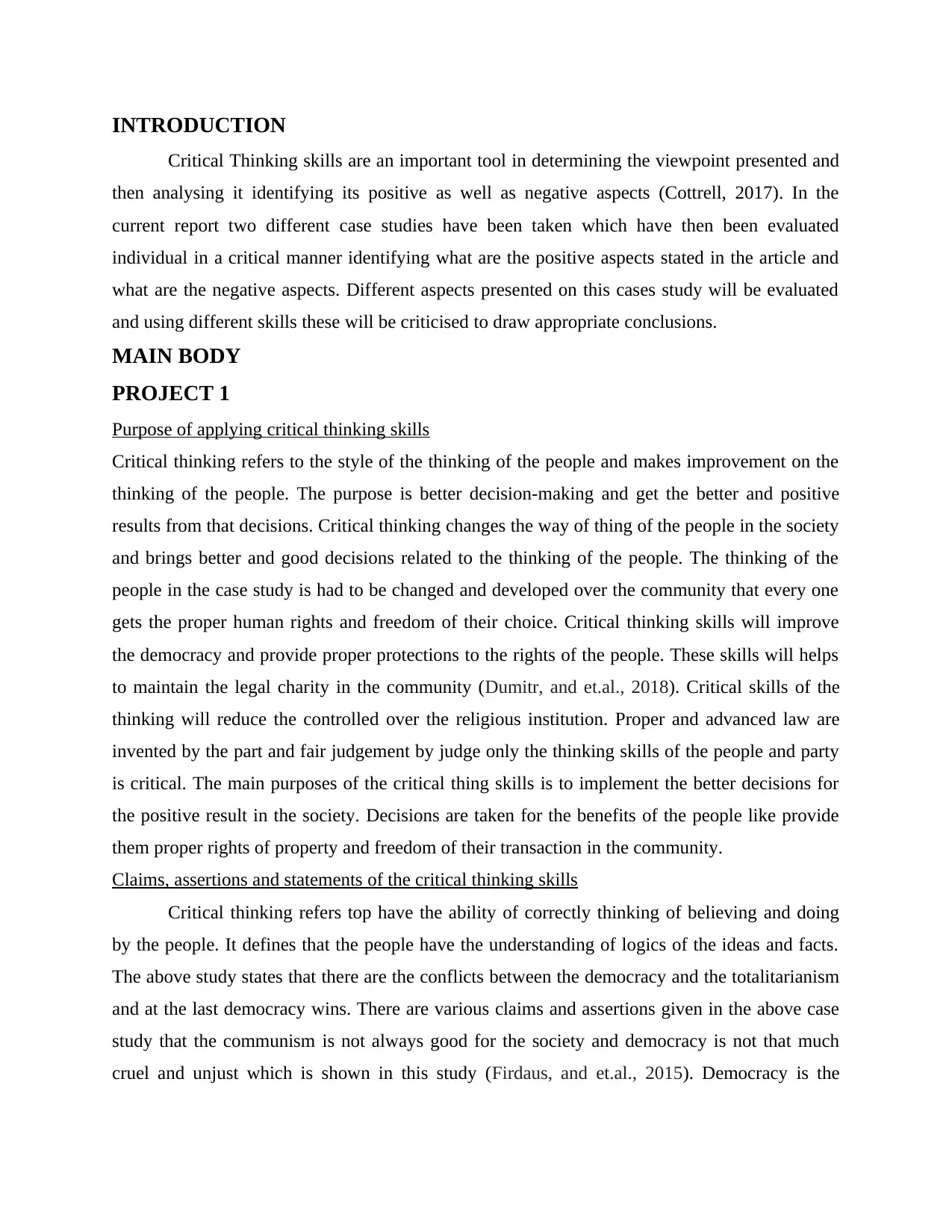
INTRODUCTION
Critical Thinking skills are an important tool in determining the viewpoint presented and
then analysing it identifying its positive as well as negative aspects (Cottrell, 2017). In the
current report two different case studies have been taken which have then been evaluated
individual in a critical manner identifying what are the positive aspects stated in the article and
what are the negative aspects. Different aspects presented on this cases study will be evaluated
and using different skills these will be criticised to draw appropriate conclusions.
MAIN BODY
PROJECT 1
Purpose of applying critical thinking skills
Critical thinking refers to the style of the thinking of the people and makes improvement on the
thinking of the people. The purpose is better decision-making and get the better and positive
results from that decisions. Critical thinking changes the way of thing of the people in the society
and brings better and good decisions related to the thinking of the people. The thinking of the
people in the case study is had to be changed and developed over the community that every one
gets the proper human rights and freedom of their choice. Critical thinking skills will improve
the democracy and provide proper protections to the rights of the people. These skills will helps
to maintain the legal charity in the community (Dumitr, and et.al., 2018). Critical skills of the
thinking will reduce the controlled over the religious institution. Proper and advanced law are
invented by the part and fair judgement by judge only the thinking skills of the people and party
is critical. The main purposes of the critical thing skills is to implement the better decisions for
the positive result in the society. Decisions are taken for the benefits of the people like provide
them proper rights of property and freedom of their transaction in the community.
Claims, assertions and statements of the critical thinking skills
Critical thinking refers top have the ability of correctly thinking of believing and doing
by the people. It defines that the people have the understanding of logics of the ideas and facts.
The above study states that there are the conflicts between the democracy and the totalitarianism
and at the last democracy wins. There are various claims and assertions given in the above case
study that the communism is not always good for the society and democracy is not that much
cruel and unjust which is shown in this study (Firdaus, and et.al., 2015). Democracy is the
Critical Thinking skills are an important tool in determining the viewpoint presented and
then analysing it identifying its positive as well as negative aspects (Cottrell, 2017). In the
current report two different case studies have been taken which have then been evaluated
individual in a critical manner identifying what are the positive aspects stated in the article and
what are the negative aspects. Different aspects presented on this cases study will be evaluated
and using different skills these will be criticised to draw appropriate conclusions.
MAIN BODY
PROJECT 1
Purpose of applying critical thinking skills
Critical thinking refers to the style of the thinking of the people and makes improvement on the
thinking of the people. The purpose is better decision-making and get the better and positive
results from that decisions. Critical thinking changes the way of thing of the people in the society
and brings better and good decisions related to the thinking of the people. The thinking of the
people in the case study is had to be changed and developed over the community that every one
gets the proper human rights and freedom of their choice. Critical thinking skills will improve
the democracy and provide proper protections to the rights of the people. These skills will helps
to maintain the legal charity in the community (Dumitr, and et.al., 2018). Critical skills of the
thinking will reduce the controlled over the religious institution. Proper and advanced law are
invented by the part and fair judgement by judge only the thinking skills of the people and party
is critical. The main purposes of the critical thing skills is to implement the better decisions for
the positive result in the society. Decisions are taken for the benefits of the people like provide
them proper rights of property and freedom of their transaction in the community.
Claims, assertions and statements of the critical thinking skills
Critical thinking refers top have the ability of correctly thinking of believing and doing
by the people. It defines that the people have the understanding of logics of the ideas and facts.
The above study states that there are the conflicts between the democracy and the totalitarianism
and at the last democracy wins. There are various claims and assertions given in the above case
study that the communism is not always good for the society and democracy is not that much
cruel and unjust which is shown in this study (Firdaus, and et.al., 2015). Democracy is the
⊘ This is a preview!⊘
Do you want full access?
Subscribe today to unlock all pages.

Trusted by 1+ million students worldwide
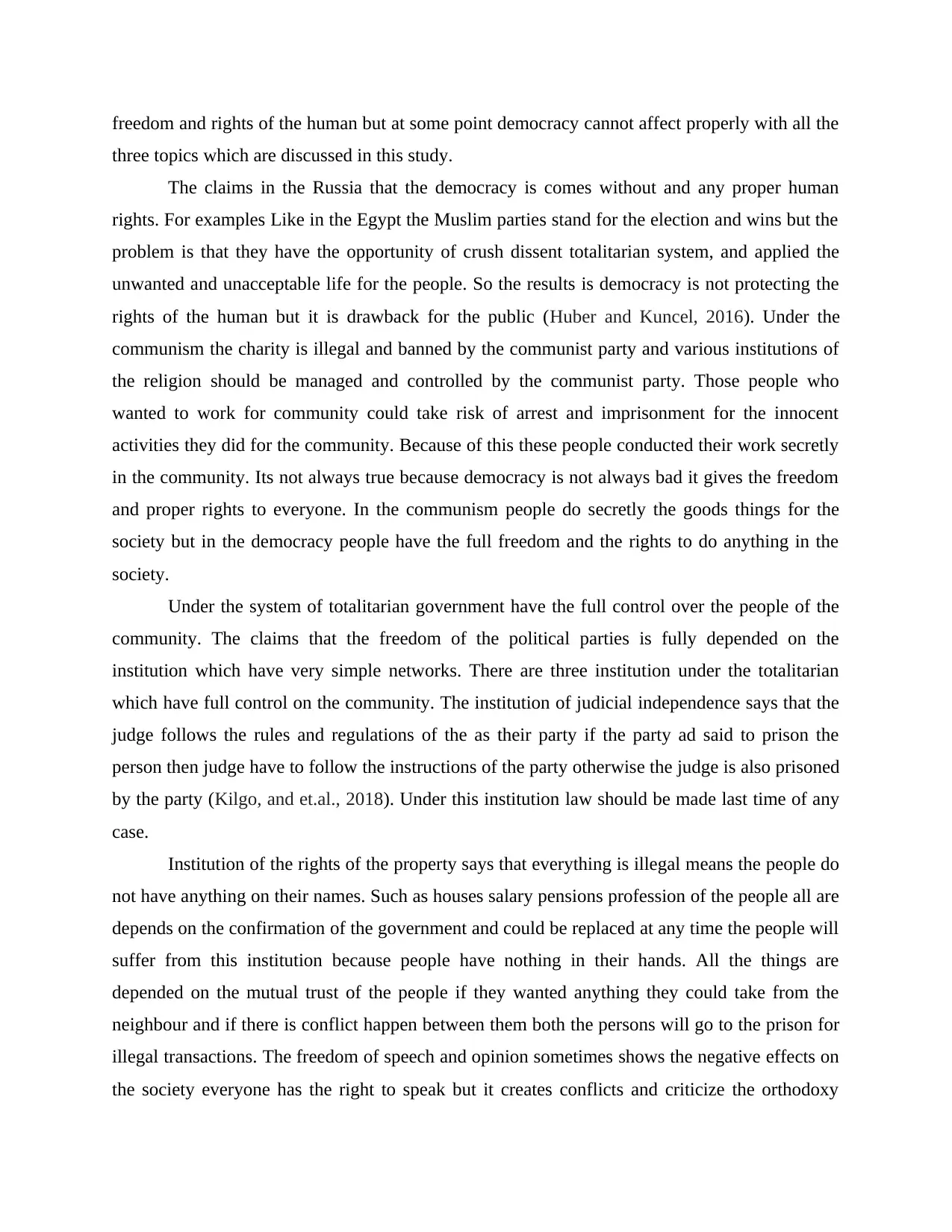
freedom and rights of the human but at some point democracy cannot affect properly with all the
three topics which are discussed in this study.
The claims in the Russia that the democracy is comes without and any proper human
rights. For examples Like in the Egypt the Muslim parties stand for the election and wins but the
problem is that they have the opportunity of crush dissent totalitarian system, and applied the
unwanted and unacceptable life for the people. So the results is democracy is not protecting the
rights of the human but it is drawback for the public (Huber and Kuncel, 2016). Under the
communism the charity is illegal and banned by the communist party and various institutions of
the religion should be managed and controlled by the communist party. Those people who
wanted to work for community could take risk of arrest and imprisonment for the innocent
activities they did for the community. Because of this these people conducted their work secretly
in the community. Its not always true because democracy is not always bad it gives the freedom
and proper rights to everyone. In the communism people do secretly the goods things for the
society but in the democracy people have the full freedom and the rights to do anything in the
society.
Under the system of totalitarian government have the full control over the people of the
community. The claims that the freedom of the political parties is fully depended on the
institution which have very simple networks. There are three institution under the totalitarian
which have full control on the community. The institution of judicial independence says that the
judge follows the rules and regulations of the as their party if the party ad said to prison the
person then judge have to follow the instructions of the party otherwise the judge is also prisoned
by the party (Kilgo, and et.al., 2018). Under this institution law should be made last time of any
case.
Institution of the rights of the property says that everything is illegal means the people do
not have anything on their names. Such as houses salary pensions profession of the people all are
depends on the confirmation of the government and could be replaced at any time the people will
suffer from this institution because people have nothing in their hands. All the things are
depended on the mutual trust of the people if they wanted anything they could take from the
neighbour and if there is conflict happen between them both the persons will go to the prison for
illegal transactions. The freedom of speech and opinion sometimes shows the negative effects on
the society everyone has the right to speak but it creates conflicts and criticize the orthodoxy
three topics which are discussed in this study.
The claims in the Russia that the democracy is comes without and any proper human
rights. For examples Like in the Egypt the Muslim parties stand for the election and wins but the
problem is that they have the opportunity of crush dissent totalitarian system, and applied the
unwanted and unacceptable life for the people. So the results is democracy is not protecting the
rights of the human but it is drawback for the public (Huber and Kuncel, 2016). Under the
communism the charity is illegal and banned by the communist party and various institutions of
the religion should be managed and controlled by the communist party. Those people who
wanted to work for community could take risk of arrest and imprisonment for the innocent
activities they did for the community. Because of this these people conducted their work secretly
in the community. Its not always true because democracy is not always bad it gives the freedom
and proper rights to everyone. In the communism people do secretly the goods things for the
society but in the democracy people have the full freedom and the rights to do anything in the
society.
Under the system of totalitarian government have the full control over the people of the
community. The claims that the freedom of the political parties is fully depended on the
institution which have very simple networks. There are three institution under the totalitarian
which have full control on the community. The institution of judicial independence says that the
judge follows the rules and regulations of the as their party if the party ad said to prison the
person then judge have to follow the instructions of the party otherwise the judge is also prisoned
by the party (Kilgo, and et.al., 2018). Under this institution law should be made last time of any
case.
Institution of the rights of the property says that everything is illegal means the people do
not have anything on their names. Such as houses salary pensions profession of the people all are
depends on the confirmation of the government and could be replaced at any time the people will
suffer from this institution because people have nothing in their hands. All the things are
depended on the mutual trust of the people if they wanted anything they could take from the
neighbour and if there is conflict happen between them both the persons will go to the prison for
illegal transactions. The freedom of speech and opinion sometimes shows the negative effects on
the society everyone has the right to speak but it creates conflicts and criticize the orthodoxy
Paraphrase This Document
Need a fresh take? Get an instant paraphrase of this document with our AI Paraphraser
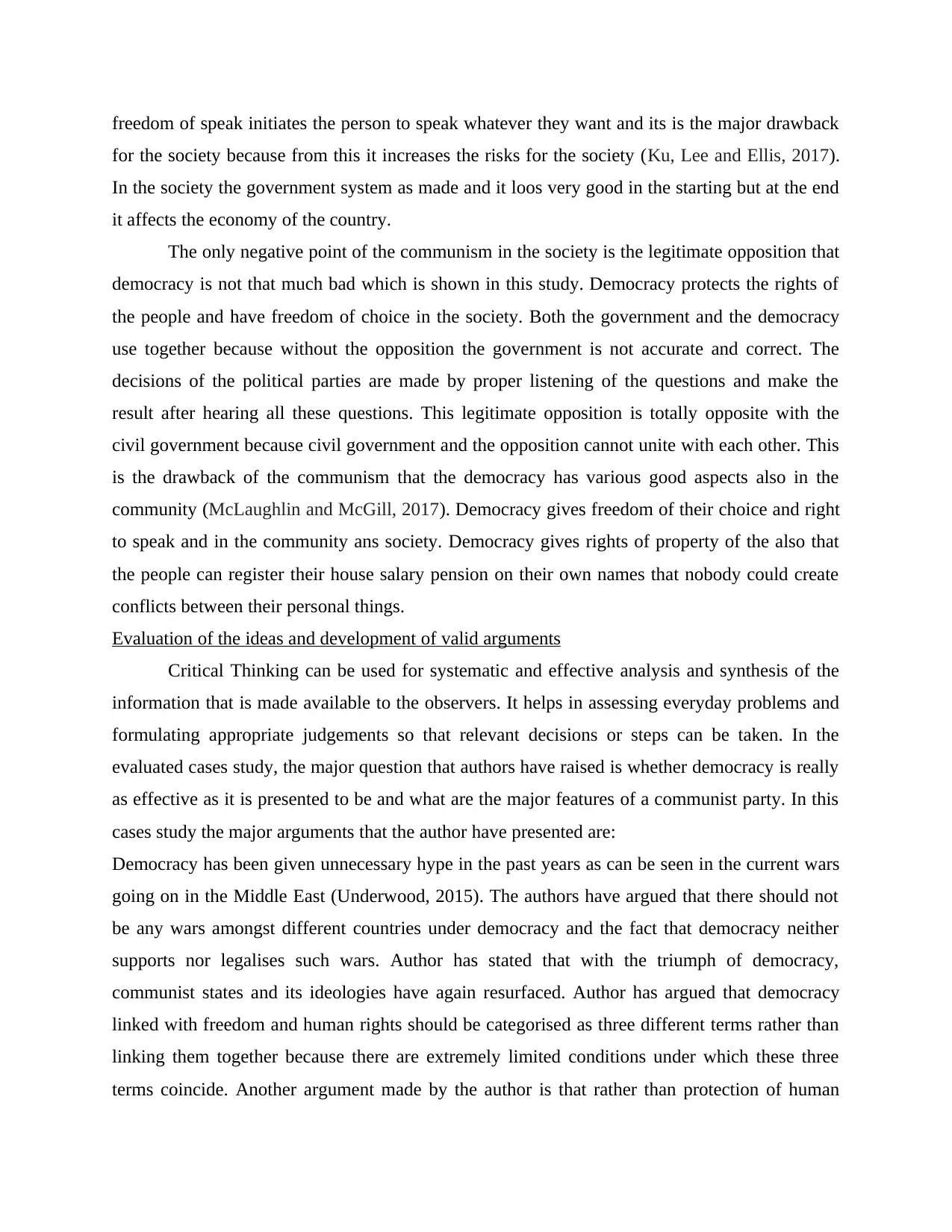
freedom of speak initiates the person to speak whatever they want and its is the major drawback
for the society because from this it increases the risks for the society (Ku, Lee and Ellis, 2017).
In the society the government system as made and it loos very good in the starting but at the end
it affects the economy of the country.
The only negative point of the communism in the society is the legitimate opposition that
democracy is not that much bad which is shown in this study. Democracy protects the rights of
the people and have freedom of choice in the society. Both the government and the democracy
use together because without the opposition the government is not accurate and correct. The
decisions of the political parties are made by proper listening of the questions and make the
result after hearing all these questions. This legitimate opposition is totally opposite with the
civil government because civil government and the opposition cannot unite with each other. This
is the drawback of the communism that the democracy has various good aspects also in the
community (McLaughlin and McGill, 2017). Democracy gives freedom of their choice and right
to speak and in the community ans society. Democracy gives rights of property of the also that
the people can register their house salary pension on their own names that nobody could create
conflicts between their personal things.
Evaluation of the ideas and development of valid arguments
Critical Thinking can be used for systematic and effective analysis and synthesis of the
information that is made available to the observers. It helps in assessing everyday problems and
formulating appropriate judgements so that relevant decisions or steps can be taken. In the
evaluated cases study, the major question that authors have raised is whether democracy is really
as effective as it is presented to be and what are the major features of a communist party. In this
cases study the major arguments that the author have presented are:
Democracy has been given unnecessary hype in the past years as can be seen in the current wars
going on in the Middle East (Underwood, 2015). The authors have argued that there should not
be any wars amongst different countries under democracy and the fact that democracy neither
supports nor legalises such wars. Author has stated that with the triumph of democracy,
communist states and its ideologies have again resurfaced. Author has argued that democracy
linked with freedom and human rights should be categorised as three different terms rather than
linking them together because there are extremely limited conditions under which these three
terms coincide. Another argument made by the author is that rather than protection of human
for the society because from this it increases the risks for the society (Ku, Lee and Ellis, 2017).
In the society the government system as made and it loos very good in the starting but at the end
it affects the economy of the country.
The only negative point of the communism in the society is the legitimate opposition that
democracy is not that much bad which is shown in this study. Democracy protects the rights of
the people and have freedom of choice in the society. Both the government and the democracy
use together because without the opposition the government is not accurate and correct. The
decisions of the political parties are made by proper listening of the questions and make the
result after hearing all these questions. This legitimate opposition is totally opposite with the
civil government because civil government and the opposition cannot unite with each other. This
is the drawback of the communism that the democracy has various good aspects also in the
community (McLaughlin and McGill, 2017). Democracy gives freedom of their choice and right
to speak and in the community ans society. Democracy gives rights of property of the also that
the people can register their house salary pension on their own names that nobody could create
conflicts between their personal things.
Evaluation of the ideas and development of valid arguments
Critical Thinking can be used for systematic and effective analysis and synthesis of the
information that is made available to the observers. It helps in assessing everyday problems and
formulating appropriate judgements so that relevant decisions or steps can be taken. In the
evaluated cases study, the major question that authors have raised is whether democracy is really
as effective as it is presented to be and what are the major features of a communist party. In this
cases study the major arguments that the author have presented are:
Democracy has been given unnecessary hype in the past years as can be seen in the current wars
going on in the Middle East (Underwood, 2015). The authors have argued that there should not
be any wars amongst different countries under democracy and the fact that democracy neither
supports nor legalises such wars. Author has stated that with the triumph of democracy,
communist states and its ideologies have again resurfaced. Author has argued that democracy
linked with freedom and human rights should be categorised as three different terms rather than
linking them together because there are extremely limited conditions under which these three
terms coincide. Another argument made by the author is that rather than protection of human
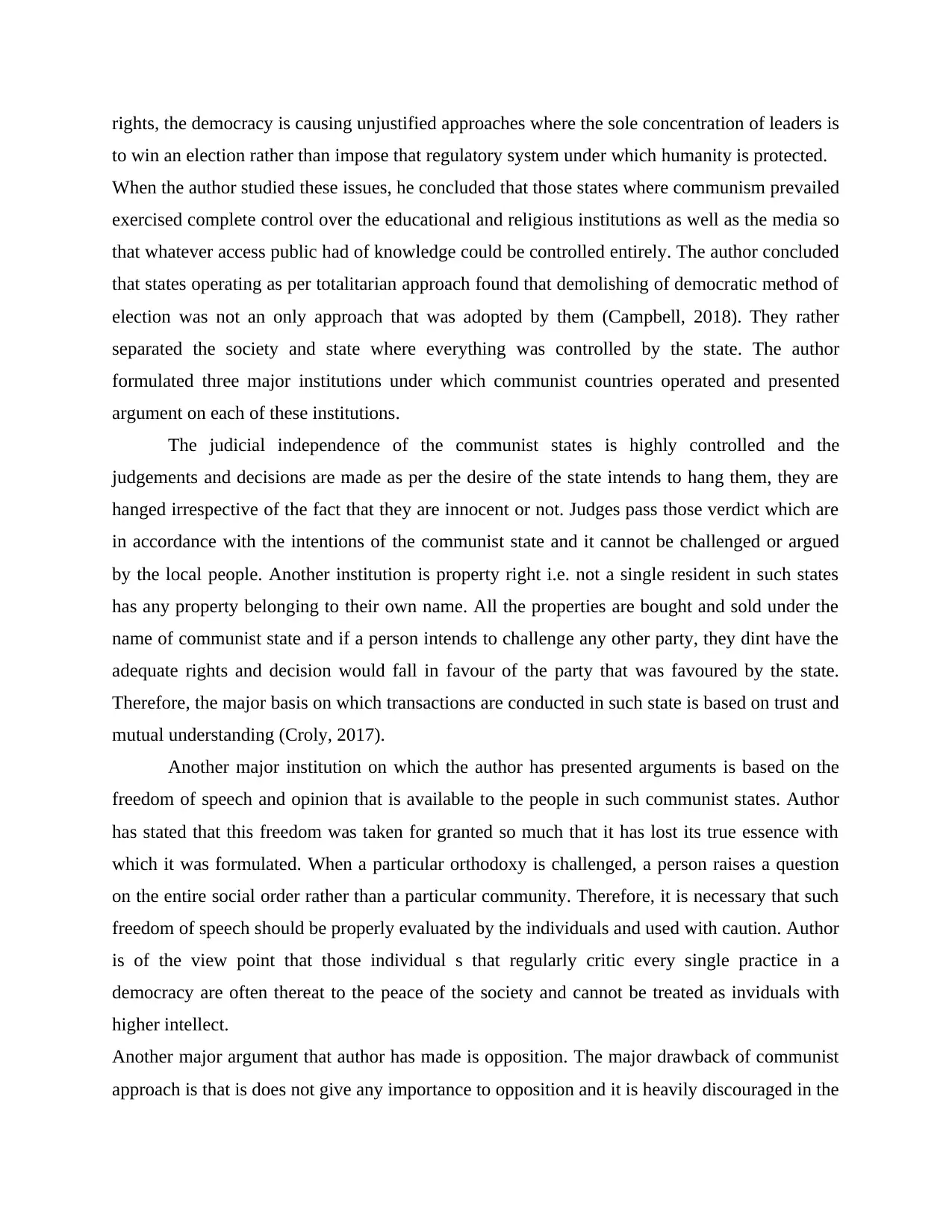
rights, the democracy is causing unjustified approaches where the sole concentration of leaders is
to win an election rather than impose that regulatory system under which humanity is protected.
When the author studied these issues, he concluded that those states where communism prevailed
exercised complete control over the educational and religious institutions as well as the media so
that whatever access public had of knowledge could be controlled entirely. The author concluded
that states operating as per totalitarian approach found that demolishing of democratic method of
election was not an only approach that was adopted by them (Campbell, 2018). They rather
separated the society and state where everything was controlled by the state. The author
formulated three major institutions under which communist countries operated and presented
argument on each of these institutions.
The judicial independence of the communist states is highly controlled and the
judgements and decisions are made as per the desire of the state intends to hang them, they are
hanged irrespective of the fact that they are innocent or not. Judges pass those verdict which are
in accordance with the intentions of the communist state and it cannot be challenged or argued
by the local people. Another institution is property right i.e. not a single resident in such states
has any property belonging to their own name. All the properties are bought and sold under the
name of communist state and if a person intends to challenge any other party, they dint have the
adequate rights and decision would fall in favour of the party that was favoured by the state.
Therefore, the major basis on which transactions are conducted in such state is based on trust and
mutual understanding (Croly, 2017).
Another major institution on which the author has presented arguments is based on the
freedom of speech and opinion that is available to the people in such communist states. Author
has stated that this freedom was taken for granted so much that it has lost its true essence with
which it was formulated. When a particular orthodoxy is challenged, a person raises a question
on the entire social order rather than a particular community. Therefore, it is necessary that such
freedom of speech should be properly evaluated by the individuals and used with caution. Author
is of the view point that those individual s that regularly critic every single practice in a
democracy are often thereat to the peace of the society and cannot be treated as inviduals with
higher intellect.
Another major argument that author has made is opposition. The major drawback of communist
approach is that is does not give any importance to opposition and it is heavily discouraged in the
to win an election rather than impose that regulatory system under which humanity is protected.
When the author studied these issues, he concluded that those states where communism prevailed
exercised complete control over the educational and religious institutions as well as the media so
that whatever access public had of knowledge could be controlled entirely. The author concluded
that states operating as per totalitarian approach found that demolishing of democratic method of
election was not an only approach that was adopted by them (Campbell, 2018). They rather
separated the society and state where everything was controlled by the state. The author
formulated three major institutions under which communist countries operated and presented
argument on each of these institutions.
The judicial independence of the communist states is highly controlled and the
judgements and decisions are made as per the desire of the state intends to hang them, they are
hanged irrespective of the fact that they are innocent or not. Judges pass those verdict which are
in accordance with the intentions of the communist state and it cannot be challenged or argued
by the local people. Another institution is property right i.e. not a single resident in such states
has any property belonging to their own name. All the properties are bought and sold under the
name of communist state and if a person intends to challenge any other party, they dint have the
adequate rights and decision would fall in favour of the party that was favoured by the state.
Therefore, the major basis on which transactions are conducted in such state is based on trust and
mutual understanding (Croly, 2017).
Another major institution on which the author has presented arguments is based on the
freedom of speech and opinion that is available to the people in such communist states. Author
has stated that this freedom was taken for granted so much that it has lost its true essence with
which it was formulated. When a particular orthodoxy is challenged, a person raises a question
on the entire social order rather than a particular community. Therefore, it is necessary that such
freedom of speech should be properly evaluated by the individuals and used with caution. Author
is of the view point that those individual s that regularly critic every single practice in a
democracy are often thereat to the peace of the society and cannot be treated as inviduals with
higher intellect.
Another major argument that author has made is opposition. The major drawback of communist
approach is that is does not give any importance to opposition and it is heavily discouraged in the
⊘ This is a preview!⊘
Do you want full access?
Subscribe today to unlock all pages.

Trusted by 1+ million students worldwide
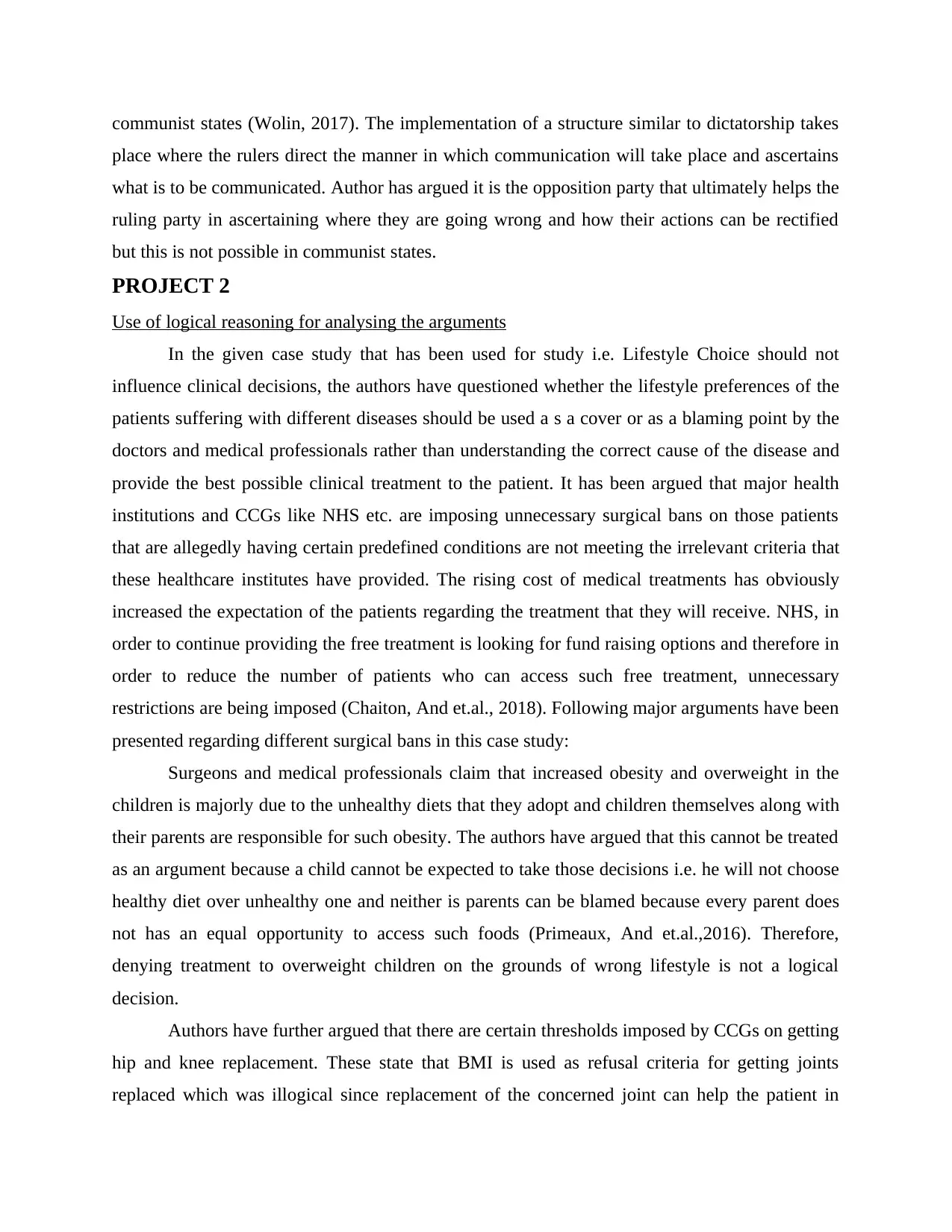
communist states (Wolin, 2017). The implementation of a structure similar to dictatorship takes
place where the rulers direct the manner in which communication will take place and ascertains
what is to be communicated. Author has argued it is the opposition party that ultimately helps the
ruling party in ascertaining where they are going wrong and how their actions can be rectified
but this is not possible in communist states.
PROJECT 2
Use of logical reasoning for analysing the arguments
In the given case study that has been used for study i.e. Lifestyle Choice should not
influence clinical decisions, the authors have questioned whether the lifestyle preferences of the
patients suffering with different diseases should be used a s a cover or as a blaming point by the
doctors and medical professionals rather than understanding the correct cause of the disease and
provide the best possible clinical treatment to the patient. It has been argued that major health
institutions and CCGs like NHS etc. are imposing unnecessary surgical bans on those patients
that are allegedly having certain predefined conditions are not meeting the irrelevant criteria that
these healthcare institutes have provided. The rising cost of medical treatments has obviously
increased the expectation of the patients regarding the treatment that they will receive. NHS, in
order to continue providing the free treatment is looking for fund raising options and therefore in
order to reduce the number of patients who can access such free treatment, unnecessary
restrictions are being imposed (Chaiton, And et.al., 2018). Following major arguments have been
presented regarding different surgical bans in this case study:
Surgeons and medical professionals claim that increased obesity and overweight in the
children is majorly due to the unhealthy diets that they adopt and children themselves along with
their parents are responsible for such obesity. The authors have argued that this cannot be treated
as an argument because a child cannot be expected to take those decisions i.e. he will not choose
healthy diet over unhealthy one and neither is parents can be blamed because every parent does
not has an equal opportunity to access such foods (Primeaux, And et.al.,2016). Therefore,
denying treatment to overweight children on the grounds of wrong lifestyle is not a logical
decision.
Authors have further argued that there are certain thresholds imposed by CCGs on getting
hip and knee replacement. These state that BMI is used as refusal criteria for getting joints
replaced which was illogical since replacement of the concerned joint can help the patient in
place where the rulers direct the manner in which communication will take place and ascertains
what is to be communicated. Author has argued it is the opposition party that ultimately helps the
ruling party in ascertaining where they are going wrong and how their actions can be rectified
but this is not possible in communist states.
PROJECT 2
Use of logical reasoning for analysing the arguments
In the given case study that has been used for study i.e. Lifestyle Choice should not
influence clinical decisions, the authors have questioned whether the lifestyle preferences of the
patients suffering with different diseases should be used a s a cover or as a blaming point by the
doctors and medical professionals rather than understanding the correct cause of the disease and
provide the best possible clinical treatment to the patient. It has been argued that major health
institutions and CCGs like NHS etc. are imposing unnecessary surgical bans on those patients
that are allegedly having certain predefined conditions are not meeting the irrelevant criteria that
these healthcare institutes have provided. The rising cost of medical treatments has obviously
increased the expectation of the patients regarding the treatment that they will receive. NHS, in
order to continue providing the free treatment is looking for fund raising options and therefore in
order to reduce the number of patients who can access such free treatment, unnecessary
restrictions are being imposed (Chaiton, And et.al., 2018). Following major arguments have been
presented regarding different surgical bans in this case study:
Surgeons and medical professionals claim that increased obesity and overweight in the
children is majorly due to the unhealthy diets that they adopt and children themselves along with
their parents are responsible for such obesity. The authors have argued that this cannot be treated
as an argument because a child cannot be expected to take those decisions i.e. he will not choose
healthy diet over unhealthy one and neither is parents can be blamed because every parent does
not has an equal opportunity to access such foods (Primeaux, And et.al.,2016). Therefore,
denying treatment to overweight children on the grounds of wrong lifestyle is not a logical
decision.
Authors have further argued that there are certain thresholds imposed by CCGs on getting
hip and knee replacement. These state that BMI is used as refusal criteria for getting joints
replaced which was illogical since replacement of the concerned joint can help the patient in
Paraphrase This Document
Need a fresh take? Get an instant paraphrase of this document with our AI Paraphraser
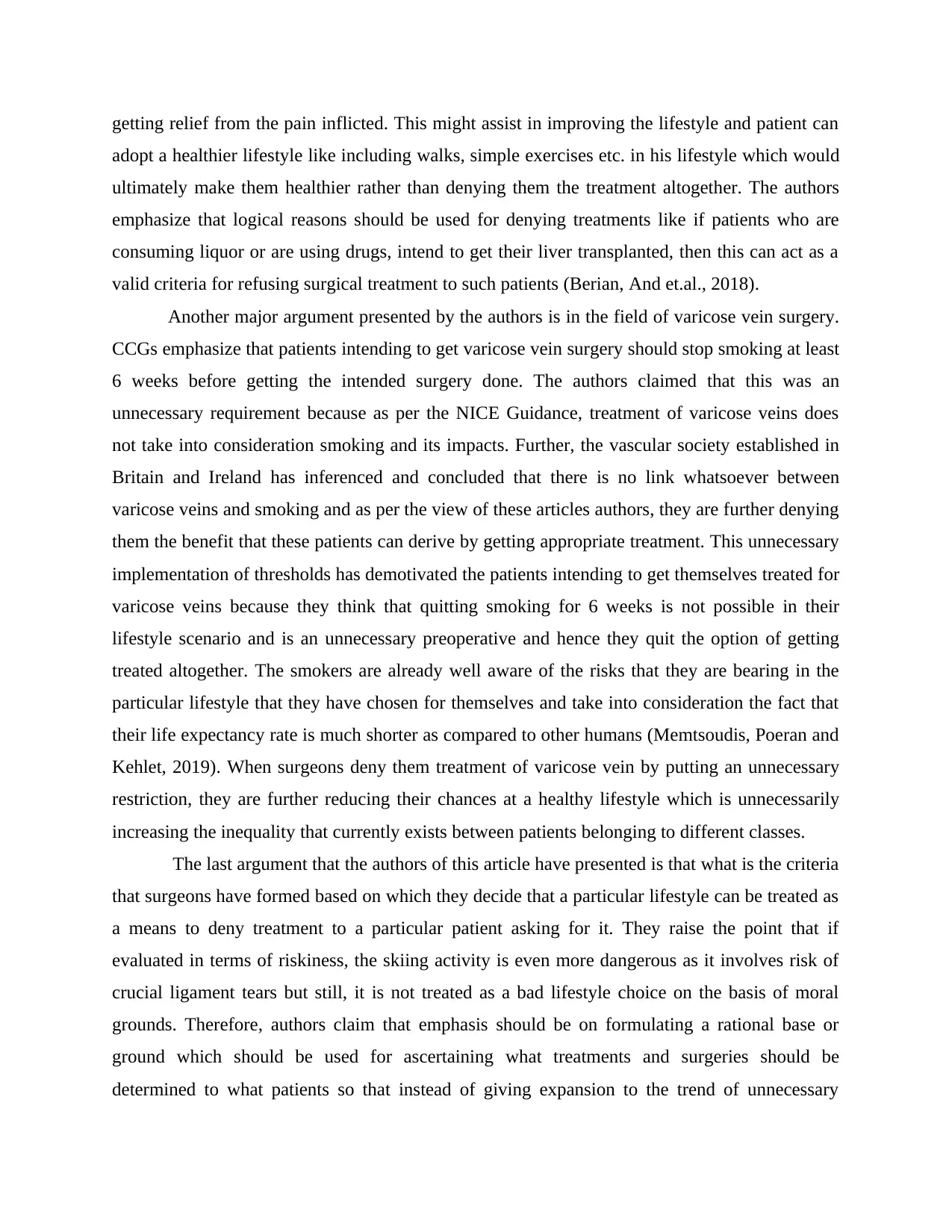
getting relief from the pain inflicted. This might assist in improving the lifestyle and patient can
adopt a healthier lifestyle like including walks, simple exercises etc. in his lifestyle which would
ultimately make them healthier rather than denying them the treatment altogether. The authors
emphasize that logical reasons should be used for denying treatments like if patients who are
consuming liquor or are using drugs, intend to get their liver transplanted, then this can act as a
valid criteria for refusing surgical treatment to such patients (Berian, And et.al., 2018).
Another major argument presented by the authors is in the field of varicose vein surgery.
CCGs emphasize that patients intending to get varicose vein surgery should stop smoking at least
6 weeks before getting the intended surgery done. The authors claimed that this was an
unnecessary requirement because as per the NICE Guidance, treatment of varicose veins does
not take into consideration smoking and its impacts. Further, the vascular society established in
Britain and Ireland has inferenced and concluded that there is no link whatsoever between
varicose veins and smoking and as per the view of these articles authors, they are further denying
them the benefit that these patients can derive by getting appropriate treatment. This unnecessary
implementation of thresholds has demotivated the patients intending to get themselves treated for
varicose veins because they think that quitting smoking for 6 weeks is not possible in their
lifestyle scenario and is an unnecessary preoperative and hence they quit the option of getting
treated altogether. The smokers are already well aware of the risks that they are bearing in the
particular lifestyle that they have chosen for themselves and take into consideration the fact that
their life expectancy rate is much shorter as compared to other humans (Memtsoudis, Poeran and
Kehlet, 2019). When surgeons deny them treatment of varicose vein by putting an unnecessary
restriction, they are further reducing their chances at a healthy lifestyle which is unnecessarily
increasing the inequality that currently exists between patients belonging to different classes.
The last argument that the authors of this article have presented is that what is the criteria
that surgeons have formed based on which they decide that a particular lifestyle can be treated as
a means to deny treatment to a particular patient asking for it. They raise the point that if
evaluated in terms of riskiness, the skiing activity is even more dangerous as it involves risk of
crucial ligament tears but still, it is not treated as a bad lifestyle choice on the basis of moral
grounds. Therefore, authors claim that emphasis should be on formulating a rational base or
ground which should be used for ascertaining what treatments and surgeries should be
determined to what patients so that instead of giving expansion to the trend of unnecessary
adopt a healthier lifestyle like including walks, simple exercises etc. in his lifestyle which would
ultimately make them healthier rather than denying them the treatment altogether. The authors
emphasize that logical reasons should be used for denying treatments like if patients who are
consuming liquor or are using drugs, intend to get their liver transplanted, then this can act as a
valid criteria for refusing surgical treatment to such patients (Berian, And et.al., 2018).
Another major argument presented by the authors is in the field of varicose vein surgery.
CCGs emphasize that patients intending to get varicose vein surgery should stop smoking at least
6 weeks before getting the intended surgery done. The authors claimed that this was an
unnecessary requirement because as per the NICE Guidance, treatment of varicose veins does
not take into consideration smoking and its impacts. Further, the vascular society established in
Britain and Ireland has inferenced and concluded that there is no link whatsoever between
varicose veins and smoking and as per the view of these articles authors, they are further denying
them the benefit that these patients can derive by getting appropriate treatment. This unnecessary
implementation of thresholds has demotivated the patients intending to get themselves treated for
varicose veins because they think that quitting smoking for 6 weeks is not possible in their
lifestyle scenario and is an unnecessary preoperative and hence they quit the option of getting
treated altogether. The smokers are already well aware of the risks that they are bearing in the
particular lifestyle that they have chosen for themselves and take into consideration the fact that
their life expectancy rate is much shorter as compared to other humans (Memtsoudis, Poeran and
Kehlet, 2019). When surgeons deny them treatment of varicose vein by putting an unnecessary
restriction, they are further reducing their chances at a healthy lifestyle which is unnecessarily
increasing the inequality that currently exists between patients belonging to different classes.
The last argument that the authors of this article have presented is that what is the criteria
that surgeons have formed based on which they decide that a particular lifestyle can be treated as
a means to deny treatment to a particular patient asking for it. They raise the point that if
evaluated in terms of riskiness, the skiing activity is even more dangerous as it involves risk of
crucial ligament tears but still, it is not treated as a bad lifestyle choice on the basis of moral
grounds. Therefore, authors claim that emphasis should be on formulating a rational base or
ground which should be used for ascertaining what treatments and surgeries should be
determined to what patients so that instead of giving expansion to the trend of unnecessary
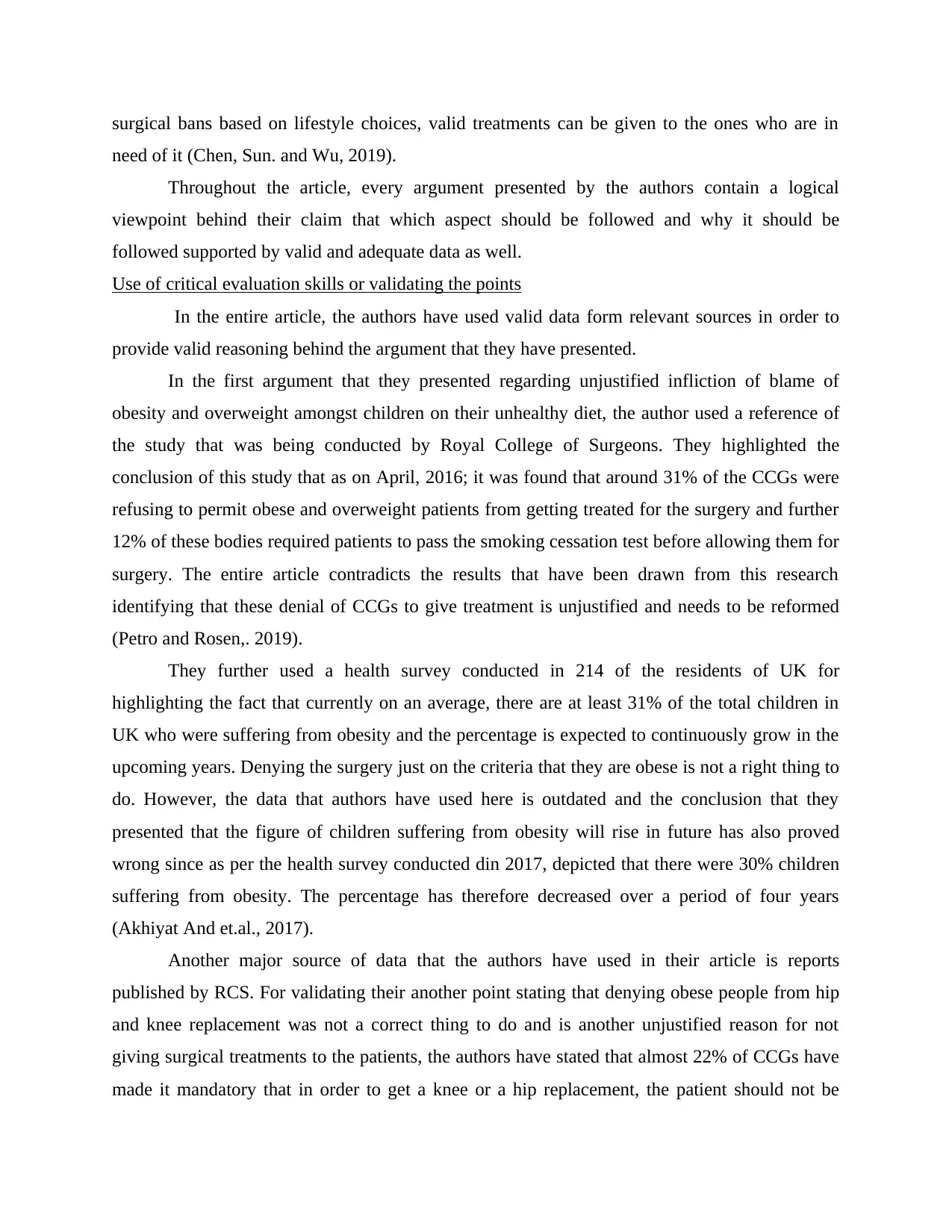
surgical bans based on lifestyle choices, valid treatments can be given to the ones who are in
need of it (Chen, Sun. and Wu, 2019).
Throughout the article, every argument presented by the authors contain a logical
viewpoint behind their claim that which aspect should be followed and why it should be
followed supported by valid and adequate data as well.
Use of critical evaluation skills or validating the points
In the entire article, the authors have used valid data form relevant sources in order to
provide valid reasoning behind the argument that they have presented.
In the first argument that they presented regarding unjustified infliction of blame of
obesity and overweight amongst children on their unhealthy diet, the author used a reference of
the study that was being conducted by Royal College of Surgeons. They highlighted the
conclusion of this study that as on April, 2016; it was found that around 31% of the CCGs were
refusing to permit obese and overweight patients from getting treated for the surgery and further
12% of these bodies required patients to pass the smoking cessation test before allowing them for
surgery. The entire article contradicts the results that have been drawn from this research
identifying that these denial of CCGs to give treatment is unjustified and needs to be reformed
(Petro and Rosen,. 2019).
They further used a health survey conducted in 214 of the residents of UK for
highlighting the fact that currently on an average, there are at least 31% of the total children in
UK who were suffering from obesity and the percentage is expected to continuously grow in the
upcoming years. Denying the surgery just on the criteria that they are obese is not a right thing to
do. However, the data that authors have used here is outdated and the conclusion that they
presented that the figure of children suffering from obesity will rise in future has also proved
wrong since as per the health survey conducted din 2017, depicted that there were 30% children
suffering from obesity. The percentage has therefore decreased over a period of four years
(Akhiyat And et.al., 2017).
Another major source of data that the authors have used in their article is reports
published by RCS. For validating their another point stating that denying obese people from hip
and knee replacement was not a correct thing to do and is another unjustified reason for not
giving surgical treatments to the patients, the authors have stated that almost 22% of CCGs have
made it mandatory that in order to get a knee or a hip replacement, the patient should not be
need of it (Chen, Sun. and Wu, 2019).
Throughout the article, every argument presented by the authors contain a logical
viewpoint behind their claim that which aspect should be followed and why it should be
followed supported by valid and adequate data as well.
Use of critical evaluation skills or validating the points
In the entire article, the authors have used valid data form relevant sources in order to
provide valid reasoning behind the argument that they have presented.
In the first argument that they presented regarding unjustified infliction of blame of
obesity and overweight amongst children on their unhealthy diet, the author used a reference of
the study that was being conducted by Royal College of Surgeons. They highlighted the
conclusion of this study that as on April, 2016; it was found that around 31% of the CCGs were
refusing to permit obese and overweight patients from getting treated for the surgery and further
12% of these bodies required patients to pass the smoking cessation test before allowing them for
surgery. The entire article contradicts the results that have been drawn from this research
identifying that these denial of CCGs to give treatment is unjustified and needs to be reformed
(Petro and Rosen,. 2019).
They further used a health survey conducted in 214 of the residents of UK for
highlighting the fact that currently on an average, there are at least 31% of the total children in
UK who were suffering from obesity and the percentage is expected to continuously grow in the
upcoming years. Denying the surgery just on the criteria that they are obese is not a right thing to
do. However, the data that authors have used here is outdated and the conclusion that they
presented that the figure of children suffering from obesity will rise in future has also proved
wrong since as per the health survey conducted din 2017, depicted that there were 30% children
suffering from obesity. The percentage has therefore decreased over a period of four years
(Akhiyat And et.al., 2017).
Another major source of data that the authors have used in their article is reports
published by RCS. For validating their another point stating that denying obese people from hip
and knee replacement was not a correct thing to do and is another unjustified reason for not
giving surgical treatments to the patients, the authors have stated that almost 22% of CCGs have
made it mandatory that in order to get a knee or a hip replacement, the patient should not be
⊘ This is a preview!⊘
Do you want full access?
Subscribe today to unlock all pages.

Trusted by 1+ million students worldwide
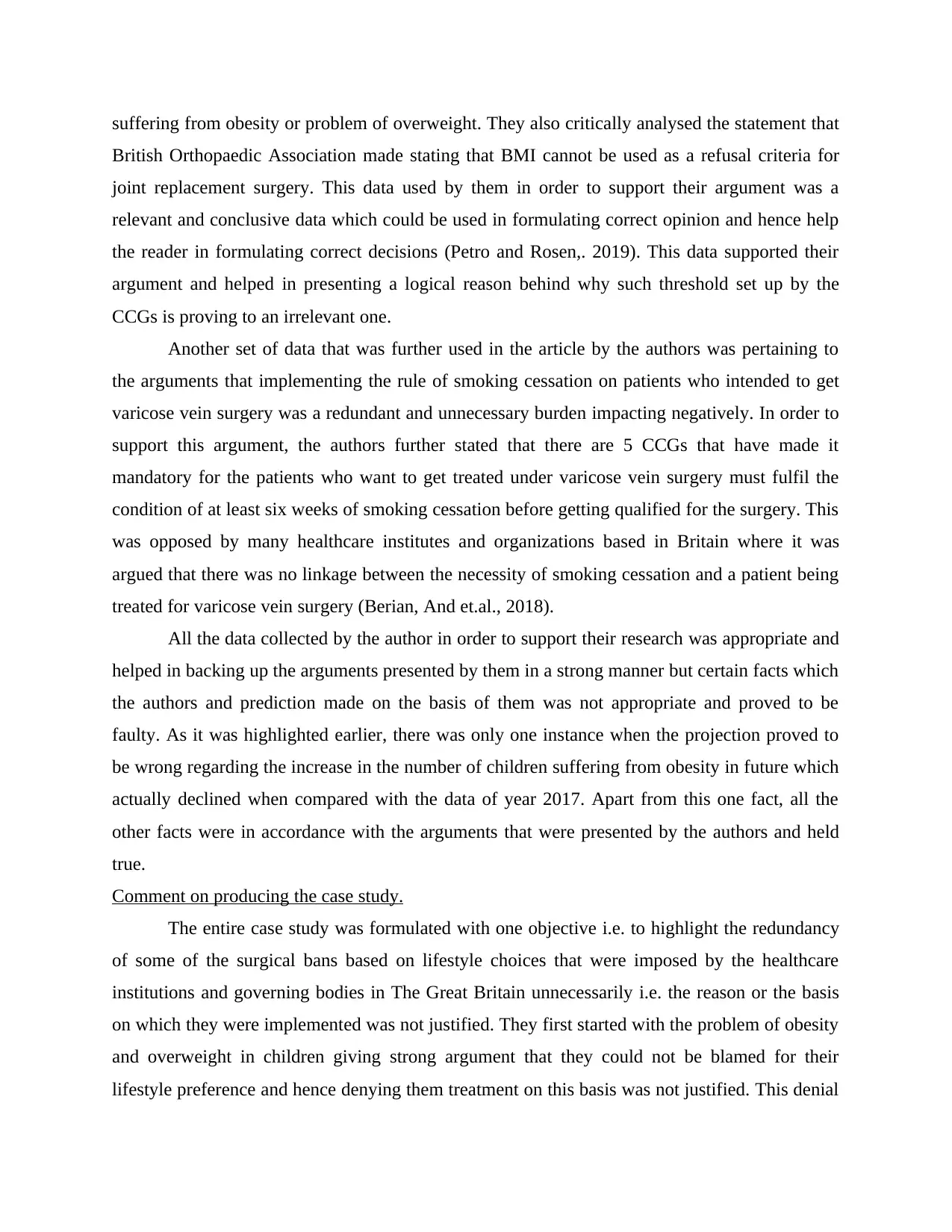
suffering from obesity or problem of overweight. They also critically analysed the statement that
British Orthopaedic Association made stating that BMI cannot be used as a refusal criteria for
joint replacement surgery. This data used by them in order to support their argument was a
relevant and conclusive data which could be used in formulating correct opinion and hence help
the reader in formulating correct decisions (Petro and Rosen,. 2019). This data supported their
argument and helped in presenting a logical reason behind why such threshold set up by the
CCGs is proving to an irrelevant one.
Another set of data that was further used in the article by the authors was pertaining to
the arguments that implementing the rule of smoking cessation on patients who intended to get
varicose vein surgery was a redundant and unnecessary burden impacting negatively. In order to
support this argument, the authors further stated that there are 5 CCGs that have made it
mandatory for the patients who want to get treated under varicose vein surgery must fulfil the
condition of at least six weeks of smoking cessation before getting qualified for the surgery. This
was opposed by many healthcare institutes and organizations based in Britain where it was
argued that there was no linkage between the necessity of smoking cessation and a patient being
treated for varicose vein surgery (Berian, And et.al., 2018).
All the data collected by the author in order to support their research was appropriate and
helped in backing up the arguments presented by them in a strong manner but certain facts which
the authors and prediction made on the basis of them was not appropriate and proved to be
faulty. As it was highlighted earlier, there was only one instance when the projection proved to
be wrong regarding the increase in the number of children suffering from obesity in future which
actually declined when compared with the data of year 2017. Apart from this one fact, all the
other facts were in accordance with the arguments that were presented by the authors and held
true.
Comment on producing the case study.
The entire case study was formulated with one objective i.e. to highlight the redundancy
of some of the surgical bans based on lifestyle choices that were imposed by the healthcare
institutions and governing bodies in The Great Britain unnecessarily i.e. the reason or the basis
on which they were implemented was not justified. They first started with the problem of obesity
and overweight in children giving strong argument that they could not be blamed for their
lifestyle preference and hence denying them treatment on this basis was not justified. This denial
British Orthopaedic Association made stating that BMI cannot be used as a refusal criteria for
joint replacement surgery. This data used by them in order to support their argument was a
relevant and conclusive data which could be used in formulating correct opinion and hence help
the reader in formulating correct decisions (Petro and Rosen,. 2019). This data supported their
argument and helped in presenting a logical reason behind why such threshold set up by the
CCGs is proving to an irrelevant one.
Another set of data that was further used in the article by the authors was pertaining to
the arguments that implementing the rule of smoking cessation on patients who intended to get
varicose vein surgery was a redundant and unnecessary burden impacting negatively. In order to
support this argument, the authors further stated that there are 5 CCGs that have made it
mandatory for the patients who want to get treated under varicose vein surgery must fulfil the
condition of at least six weeks of smoking cessation before getting qualified for the surgery. This
was opposed by many healthcare institutes and organizations based in Britain where it was
argued that there was no linkage between the necessity of smoking cessation and a patient being
treated for varicose vein surgery (Berian, And et.al., 2018).
All the data collected by the author in order to support their research was appropriate and
helped in backing up the arguments presented by them in a strong manner but certain facts which
the authors and prediction made on the basis of them was not appropriate and proved to be
faulty. As it was highlighted earlier, there was only one instance when the projection proved to
be wrong regarding the increase in the number of children suffering from obesity in future which
actually declined when compared with the data of year 2017. Apart from this one fact, all the
other facts were in accordance with the arguments that were presented by the authors and held
true.
Comment on producing the case study.
The entire case study was formulated with one objective i.e. to highlight the redundancy
of some of the surgical bans based on lifestyle choices that were imposed by the healthcare
institutions and governing bodies in The Great Britain unnecessarily i.e. the reason or the basis
on which they were implemented was not justified. They first started with the problem of obesity
and overweight in children giving strong argument that they could not be blamed for their
lifestyle preference and hence denying them treatment on this basis was not justified. This denial
Paraphrase This Document
Need a fresh take? Get an instant paraphrase of this document with our AI Paraphraser
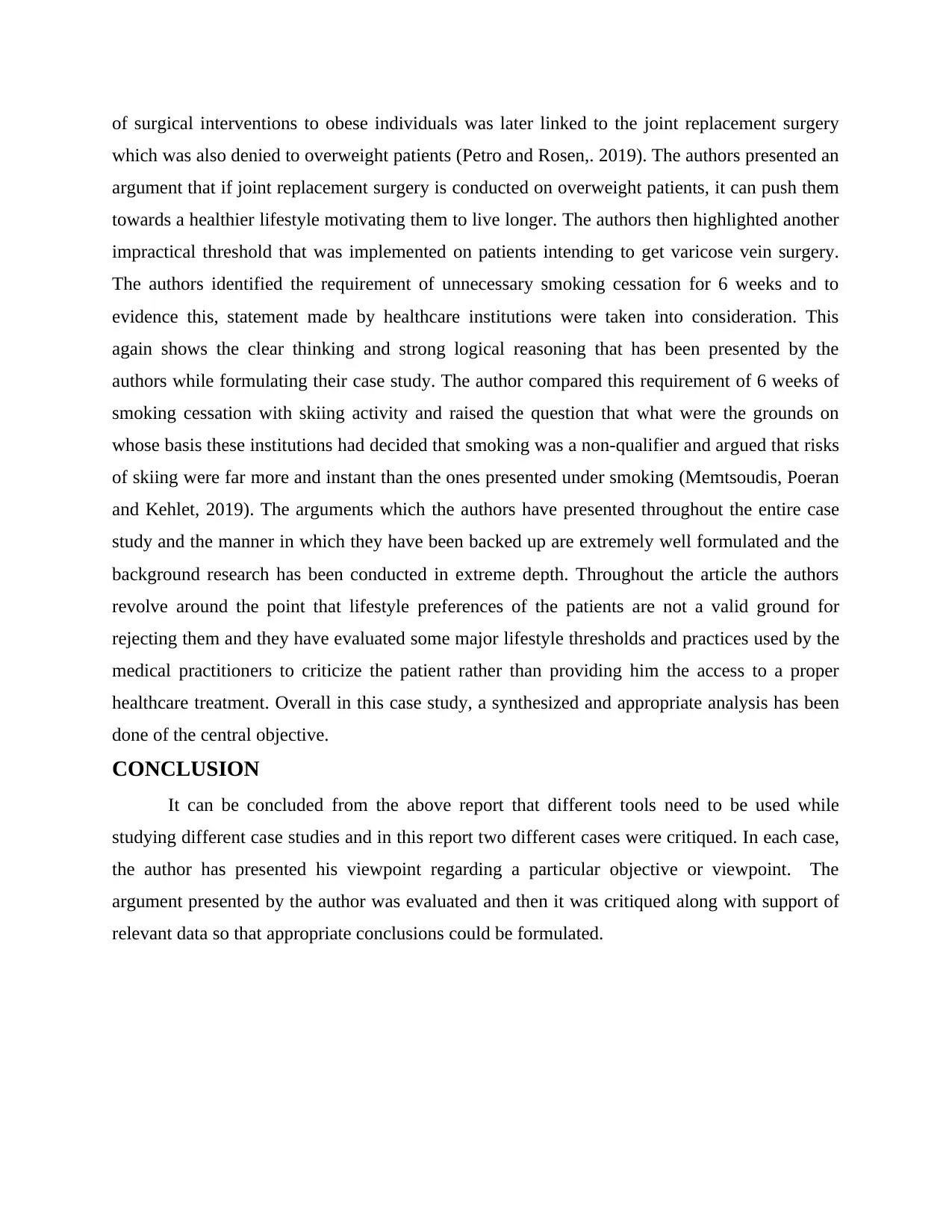
of surgical interventions to obese individuals was later linked to the joint replacement surgery
which was also denied to overweight patients (Petro and Rosen,. 2019). The authors presented an
argument that if joint replacement surgery is conducted on overweight patients, it can push them
towards a healthier lifestyle motivating them to live longer. The authors then highlighted another
impractical threshold that was implemented on patients intending to get varicose vein surgery.
The authors identified the requirement of unnecessary smoking cessation for 6 weeks and to
evidence this, statement made by healthcare institutions were taken into consideration. This
again shows the clear thinking and strong logical reasoning that has been presented by the
authors while formulating their case study. The author compared this requirement of 6 weeks of
smoking cessation with skiing activity and raised the question that what were the grounds on
whose basis these institutions had decided that smoking was a non-qualifier and argued that risks
of skiing were far more and instant than the ones presented under smoking (Memtsoudis, Poeran
and Kehlet, 2019). The arguments which the authors have presented throughout the entire case
study and the manner in which they have been backed up are extremely well formulated and the
background research has been conducted in extreme depth. Throughout the article the authors
revolve around the point that lifestyle preferences of the patients are not a valid ground for
rejecting them and they have evaluated some major lifestyle thresholds and practices used by the
medical practitioners to criticize the patient rather than providing him the access to a proper
healthcare treatment. Overall in this case study, a synthesized and appropriate analysis has been
done of the central objective.
CONCLUSION
It can be concluded from the above report that different tools need to be used while
studying different case studies and in this report two different cases were critiqued. In each case,
the author has presented his viewpoint regarding a particular objective or viewpoint. The
argument presented by the author was evaluated and then it was critiqued along with support of
relevant data so that appropriate conclusions could be formulated.
which was also denied to overweight patients (Petro and Rosen,. 2019). The authors presented an
argument that if joint replacement surgery is conducted on overweight patients, it can push them
towards a healthier lifestyle motivating them to live longer. The authors then highlighted another
impractical threshold that was implemented on patients intending to get varicose vein surgery.
The authors identified the requirement of unnecessary smoking cessation for 6 weeks and to
evidence this, statement made by healthcare institutions were taken into consideration. This
again shows the clear thinking and strong logical reasoning that has been presented by the
authors while formulating their case study. The author compared this requirement of 6 weeks of
smoking cessation with skiing activity and raised the question that what were the grounds on
whose basis these institutions had decided that smoking was a non-qualifier and argued that risks
of skiing were far more and instant than the ones presented under smoking (Memtsoudis, Poeran
and Kehlet, 2019). The arguments which the authors have presented throughout the entire case
study and the manner in which they have been backed up are extremely well formulated and the
background research has been conducted in extreme depth. Throughout the article the authors
revolve around the point that lifestyle preferences of the patients are not a valid ground for
rejecting them and they have evaluated some major lifestyle thresholds and practices used by the
medical practitioners to criticize the patient rather than providing him the access to a proper
healthcare treatment. Overall in this case study, a synthesized and appropriate analysis has been
done of the central objective.
CONCLUSION
It can be concluded from the above report that different tools need to be used while
studying different case studies and in this report two different cases were critiqued. In each case,
the author has presented his viewpoint regarding a particular objective or viewpoint. The
argument presented by the author was evaluated and then it was critiqued along with support of
relevant data so that appropriate conclusions could be formulated.
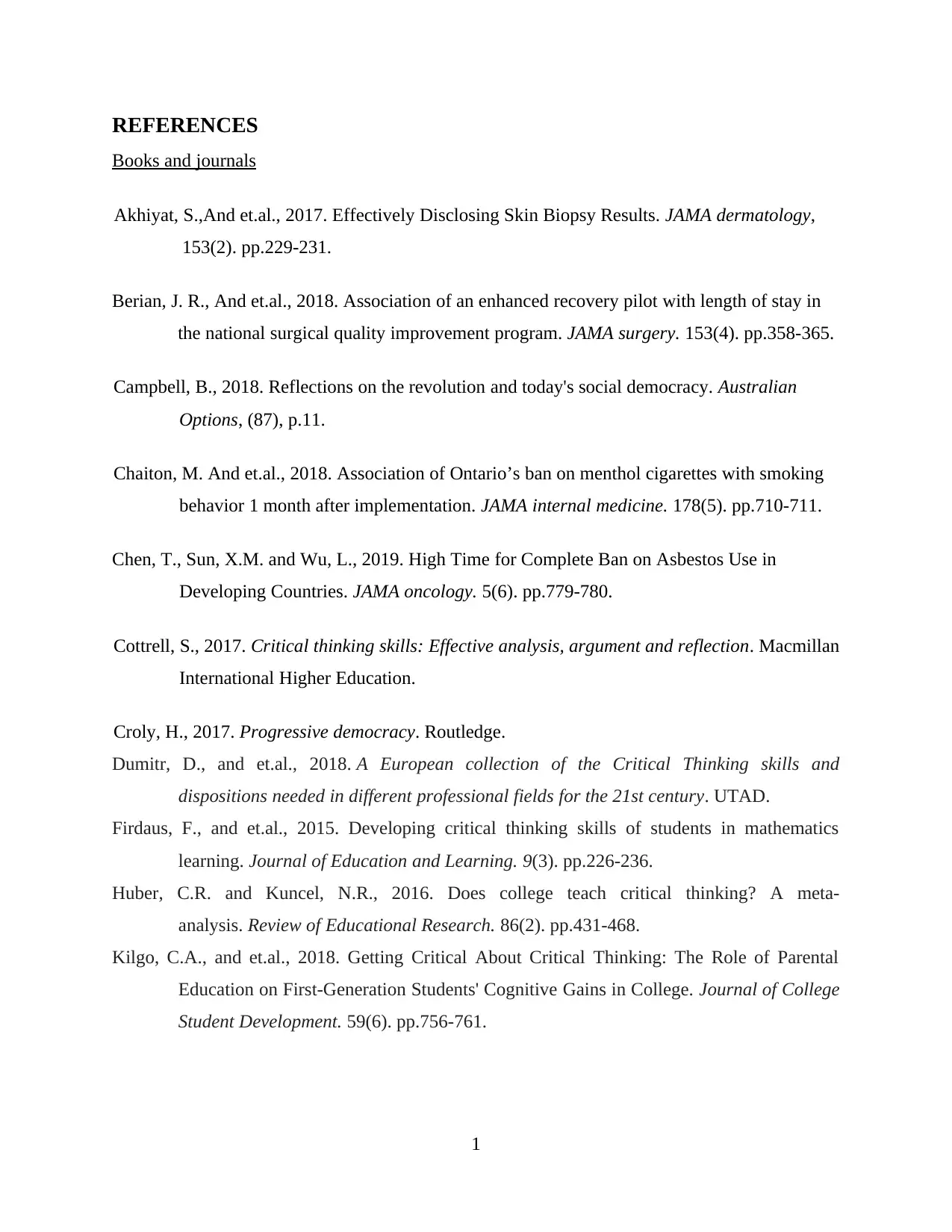
REFERENCES
Books and journals
Akhiyat, S.,And et.al., 2017. Effectively Disclosing Skin Biopsy Results. JAMA dermatology,
153(2). pp.229-231.
Berian, J. R., And et.al., 2018. Association of an enhanced recovery pilot with length of stay in
the national surgical quality improvement program. JAMA surgery. 153(4). pp.358-365.
Campbell, B., 2018. Reflections on the revolution and today's social democracy. Australian
Options, (87), p.11.
Chaiton, M. And et.al., 2018. Association of Ontario’s ban on menthol cigarettes with smoking
behavior 1 month after implementation. JAMA internal medicine. 178(5). pp.710-711.
Chen, T., Sun, X.M. and Wu, L., 2019. High Time for Complete Ban on Asbestos Use in
Developing Countries. JAMA oncology. 5(6). pp.779-780.
Cottrell, S., 2017. Critical thinking skills: Effective analysis, argument and reflection. Macmillan
International Higher Education.
Croly, H., 2017. Progressive democracy. Routledge.
Dumitr, D., and et.al., 2018. A European collection of the Critical Thinking skills and
dispositions needed in different professional fields for the 21st century. UTAD.
Firdaus, F., and et.al., 2015. Developing critical thinking skills of students in mathematics
learning. Journal of Education and Learning. 9(3). pp.226-236.
Huber, C.R. and Kuncel, N.R., 2016. Does college teach critical thinking? A meta-
analysis. Review of Educational Research. 86(2). pp.431-468.
Kilgo, C.A., and et.al., 2018. Getting Critical About Critical Thinking: The Role of Parental
Education on First-Generation Students' Cognitive Gains in College. Journal of College
Student Development. 59(6). pp.756-761.
1
Books and journals
Akhiyat, S.,And et.al., 2017. Effectively Disclosing Skin Biopsy Results. JAMA dermatology,
153(2). pp.229-231.
Berian, J. R., And et.al., 2018. Association of an enhanced recovery pilot with length of stay in
the national surgical quality improvement program. JAMA surgery. 153(4). pp.358-365.
Campbell, B., 2018. Reflections on the revolution and today's social democracy. Australian
Options, (87), p.11.
Chaiton, M. And et.al., 2018. Association of Ontario’s ban on menthol cigarettes with smoking
behavior 1 month after implementation. JAMA internal medicine. 178(5). pp.710-711.
Chen, T., Sun, X.M. and Wu, L., 2019. High Time for Complete Ban on Asbestos Use in
Developing Countries. JAMA oncology. 5(6). pp.779-780.
Cottrell, S., 2017. Critical thinking skills: Effective analysis, argument and reflection. Macmillan
International Higher Education.
Croly, H., 2017. Progressive democracy. Routledge.
Dumitr, D., and et.al., 2018. A European collection of the Critical Thinking skills and
dispositions needed in different professional fields for the 21st century. UTAD.
Firdaus, F., and et.al., 2015. Developing critical thinking skills of students in mathematics
learning. Journal of Education and Learning. 9(3). pp.226-236.
Huber, C.R. and Kuncel, N.R., 2016. Does college teach critical thinking? A meta-
analysis. Review of Educational Research. 86(2). pp.431-468.
Kilgo, C.A., and et.al., 2018. Getting Critical About Critical Thinking: The Role of Parental
Education on First-Generation Students' Cognitive Gains in College. Journal of College
Student Development. 59(6). pp.756-761.
1
⊘ This is a preview!⊘
Do you want full access?
Subscribe today to unlock all pages.

Trusted by 1+ million students worldwide
1 out of 14
Related Documents
Your All-in-One AI-Powered Toolkit for Academic Success.
+13062052269
info@desklib.com
Available 24*7 on WhatsApp / Email
![[object Object]](/_next/static/media/star-bottom.7253800d.svg)
Unlock your academic potential
Copyright © 2020–2025 A2Z Services. All Rights Reserved. Developed and managed by ZUCOL.





